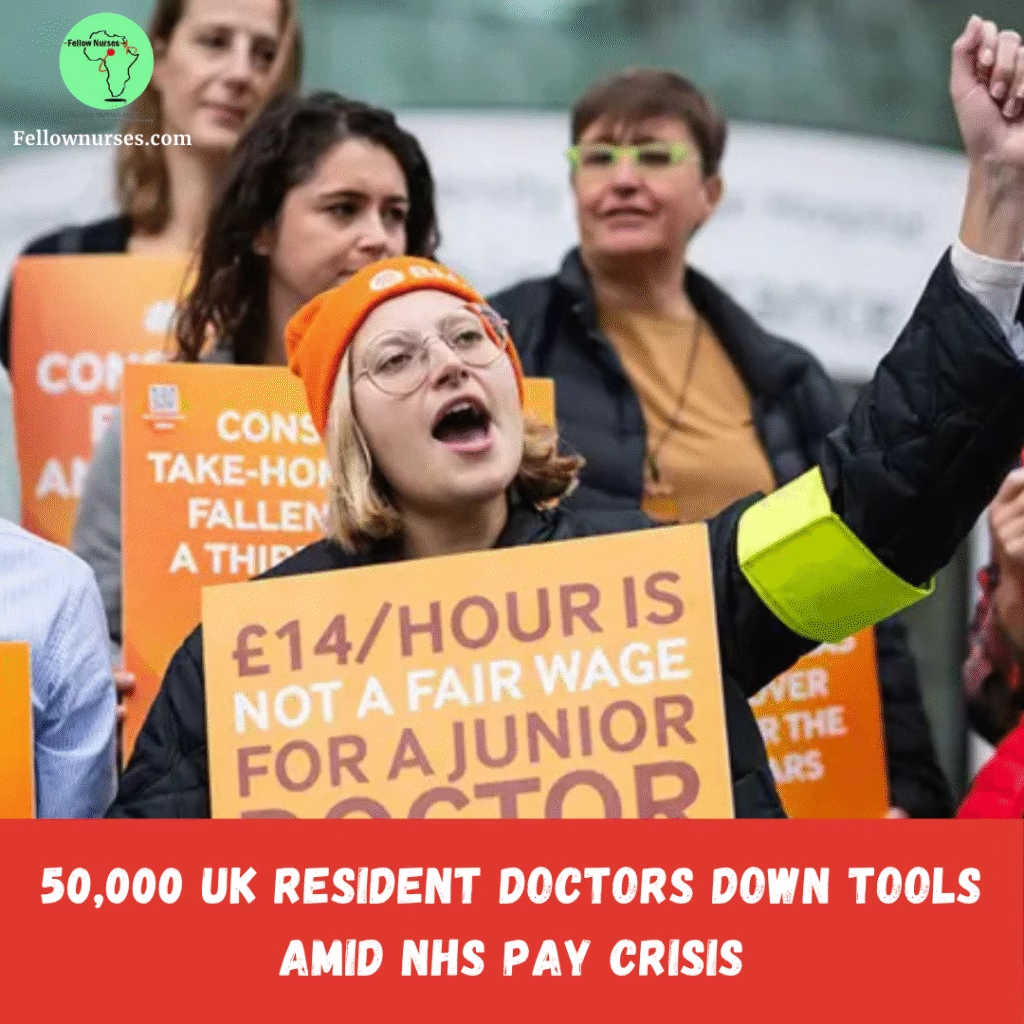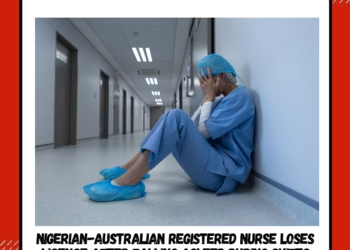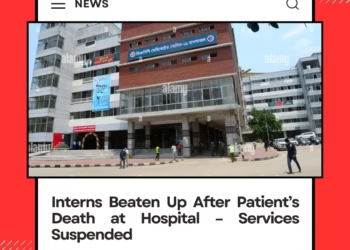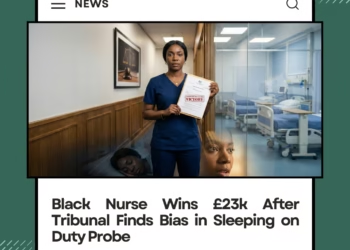Fellow Nurses Africa News | 25 July, 2025.

50,000 UK Resident Doctors Down Tools Amid NHS Pay Crisis
LONDON, UK – As of 7:00 AM today, July 25, 2025, approximately 50,000 resident doctors in England, formerly known as junior doctors, have downed tools for a five-day strike, set to end at 7:00 AM on Wednesday, July 30. Organized by the British Medical Association (BMA), this bold walkout responds to an escalating pay dispute with the UK government, disrupting non-emergency services across the National Health Service (NHS). For African healthcare workers and patients, this crisis in one of the world’s leading health systems offers urgent lessons on fair pay, workforce retention, and patient care continuity—challenges that resonate deeply in African healthcare systems.
Why Are UK Doctors Striking?
The BMA, representing over 70,000 resident doctors, is demanding a pay increase to restore salaries to their 2008 real-term value, which has declined by 20.8% due to inflation, according to the Retail Price Index (RPI). Resident doctors, who are essential to hospital and emergency care, earn between £32,400 and £61,500 annually for a standard 40-hour week, with additional payments for overtime, night shifts, and weekends. Despite a 22.3% pay rise over 2023-2024 and a 5.5% increase for 2025-2026, the BMA argues these increments fail to address long-term pay erosion.
Dr. Melissa Ryan, co-chair of the BMA’s resident doctors committee, stated, “Soaring living costs and stagnant pay are pushing doctors out of the NHS. We’re striking to protect our profession and the future of patient care.” This struggle mirrors challenges faced by African healthcare workers, where low salaries in countries like Nigeria, Kenya, and Ghana drive strikes and migration. Over 7,000 Nigerian doctors currently work in the NHS, highlighting the global competition for healthcare talent.
Health Secretary Wes Streeting has labeled the strike “regrettable,” noting that resident doctors’ recent pay rises exceed those of other public sector workers. The government has declined further pay negotiations due to budgetary constraints but has offered to discuss non-pay improvements, such as support for training costs. With no agreement reached, the strike commenced this morning, intensifying pressure on the NHS.
Impact on NHS Services
The five-day strike is expected to disrupt non-emergency NHS services significantly, with estimates suggesting up to 200,000 hospital appointments and elective procedures may be postponed, based on the impact of previous strikes. Emergency and life-preserving care, including cancer treatments and urgent surgeries, will continue, with senior doctors and consultants covering for striking residents. NHS England has urged patients to attend scheduled appointments unless contacted otherwise, use NHS 111 (online or by phone) for non-urgent needs, and reserve 999 and A&E for life-threatening emergencies. GP services and pharmacies remain operational but may face increased demand.
For African healthcare systems, where strikes and resource shortages often disrupt care, the NHS’s approach—prioritizing emergency services and clear public communication—offers a model for managing crises. For instance, during Nigeria’s 2021 resident doctors’ strike, the lack of robust contingency plans led to significant care disruptions, unlike the NHS’s structured response.
Lessons for African Healthcare Workers
The NHS pay crisis provides critical insights for African healthcare professionals:
- Fair Pay and Retention: Like UK doctors, African healthcare workers face real-term salary declines. In Kenya, doctors’ pay has not kept pace with inflation, sparking strikes and emigration. The BMA’s push for pay restoration underscores the need for African governments to address salary erosion to retain skilled professionals and reduce brain drain.
- Crisis Management: The NHS’s reliance on senior doctors to maintain emergency care during strikes highlights the value of contingency planning. African health systems, often with fewer specialists, could adopt similar strategies to ensure care continuity during disputes.
- Global Workforce Challenges: The UK’s struggle to retain doctors mirrors Africa’s, where professionals migrate to systems like the NHS for better pay and conditions. With thousands of African doctors in the NHS, this strike could impact training and job opportunities, affecting the pipeline of healthcare workers supporting African systems.
The BMA warns that understaffing, exacerbated by pay disputes, threatens patient care, a cautionary lesson for African policymakers facing similar trends.
Public and Political Tensions
Public support for the strike has fallen to 34% from 49% a year ago, according to recent polls, as repeated disruptions frustrate patients. This tension is familiar to African healthcare workers, where strikes in countries like Ghana often spark public backlash despite empathy for workers’ grievances. Politically, Prime Minister Keir Starmer faces criticism for failing to resolve the dispute, despite his government’s pledge to strengthen the NHS through reforms, including increasing annual appointments. Critics argue that ignoring pay concerns undermines these efforts.
What’s Next?
The BMA has indicated it could suspend the strike if the government presents a credible pay offer before July 30. Recent talks on non-pay solutions, such as funding for training exams, have not progressed, prompting today’s action. NHS leaders, including Sir Julian Hartley of NHS Providers, have called for urgent negotiations to minimize patient harm. Other NHS staff groups, such as nurses, are considering industrial action, which could escalate disruptions.
African healthcare workers can draw on this crisis to advocate for fair pay, improved conditions, and proactive government engagement to prevent strikes and strengthen health systems. Patients in the UK are advised to:
- Use NHS 111 (online or by phone) for non-urgent concerns.
- Contact GPs or pharmacies for routine care.
- Reserve 999 and A&E for life-threatening emergencies.
African patients with ties to the UK, such as those seeking treatment or with relatives there, should confirm appointments directly with hospitals. As the NHS grapples with this pay crisis, African healthcare professionals can push for reforms to ensure equitable, sustainable healthcare at home.
Follow Fellow Nurses Africa for updates on global healthcare workforce challenges.











So nurses are not the only ones being treated unfairly. Wow! It is well.
Hopefully, something is done in time.